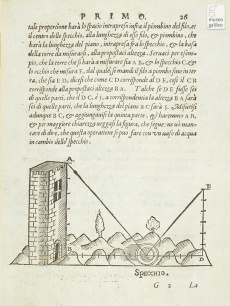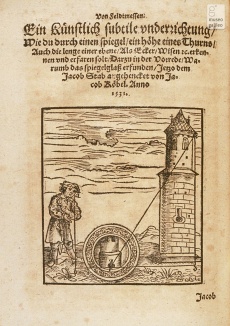Horizontal Mirror
From Inventions
m (moved Horizontal mirror to Horizontal Mirror) |
Current revision as of 10:54, 27 July 2010
Contents |
Inventor
Euclid (3rd-2nd cent. B.C.)
Historic Period
3rd cent B.C.
Description
Instrument for measuring heights described for the first time in Euclid's Optics. The visual ray in this case is reflected from a horizontal mirror, or more simply from a pond or lake, in which the observer sees the upside-down image of a tower. Since the angle of incidence and the angle of reflection of the visual ray on the surface of the mirror are equal, as demonstrated by Euclid in the first theorem of the Catoptrics, the two triangles having as hypotenuses the incident ray and the reflected ray, and as cathetuses the height of the surveyor and the distance of the tower from the mirror, are similar. In the fourteenth and fifteenth centuries, the mirror was sometimes held in the vertical position to measure the distance of an object situated behind the observer's back (Anonymous English author, fourteenth century, p. 66; L. Mainardi, c. 1488, fol. 10). These cases are quite rare, however, as compared to the more widespread utilization of the horizontal mirror (G. d'Aurillac, 972-1003, III, 8; D. da Chivasso, I, 16; Anonymous Florentine, 1460, fol. 78v; F. di Giorgio Martini, c. 1480, fols. 29r-v; L.B. Alberti, c. 1450, p.??; L. Pacioli, 1494, Trattato geometrico,VII, I, p. 50v).
Bibliographical Resources
Euclide. La prospettiva di Euclide, nella quale si tratta di quelle cose, che per raggi diritti si veggono: et di quelle, che con raggi reflessi nelli specchi appariscono. Tradotta dal R.P.M. Egnazio Danti […] insieme con la prospettiva di Eliodoro Larisseo. In Fiorenza, nella Stamperia de’ Giunti, 1573.
Anonimo, Treatise on mensuration of heights and distances: from a ms. of the 14th century (British Library, Bibl. Sloan, 213, XIV Fol. 120), in Rara matematica or, A collection of treatises on the mathematics and subjects connected with them, from ancient inedited manuscripts. Edited by James Orchard Halliwell. London, J.W. Parker, 1839, p. 66.
Mainardi, Leonardo da Cremona. Artis metrice pratice compilatio, New York, Columbia University, Butler Library, Plimpton Collection 203.
Papa Silvestro II. Geometria incerti auctoris, in Gerberti postea Silvestri II papae Opera matematica, (972-1003). Hildesheim, Georg Olms Verlagsbuchhandlung, 1963, 8.
Domenico da Chivasso. The Practica Geometriae of Dominicus de Clavasio. Edited by H.L.L. Busard, «Archive for the history of exact sciences», 2 (1965), 6, pp. 520-575.
Anonimo fiorentino. Trattato di geometria pratica,dal codice L.IV.18 (sec. XV) della Biblioteca comunale di Siena. A cura e con introduzione di Annalisa Simi. Siena, Università degli studi, 1993, c. 78v.
Francesco di Giorgio Martini. La pratica di geometria: dal codice Ashburnham 361 della Biblioteca Medicea Laurenziana di Firenze. A cura di Gino Arrighi. Firenze, Giunti, 1970, cc.29r-v.
Alberti, Leon Battista. Ludi rerum mathematicarum, in Alberti, L.B. Opere volgari, a cura di Cecili Grayson. Bari, Laterza, 1960-73, vol. 3, pp. 133-173.
Pacioli, Luca. Summa de arithmetica, geometria, proportioni et proportionalità. Venezia, Paganino de' Paganini, 1494, VII, I, p. 50v.
Images
Author of the entry: Filippo Camerota


